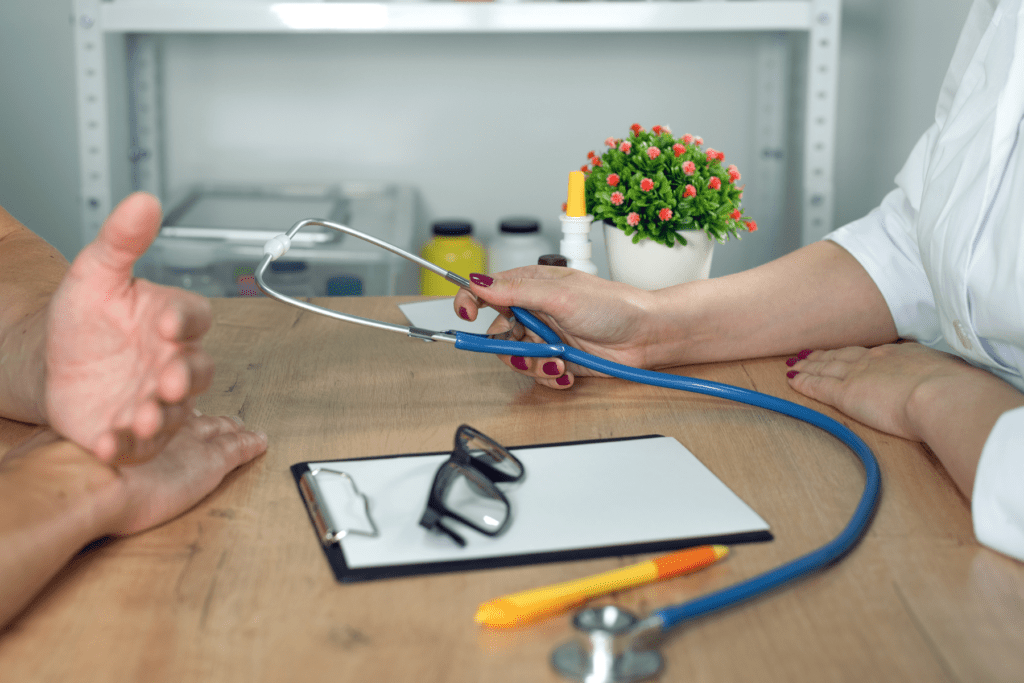
I recently returned from a trip to Bali, Indonesia, where I came down with the dreaded “Bali belly.” Something I ate or drank definitely did not agree with me. I spent the next week (and a horribly long flight home) experiencing Montezuma’s revenge. While I can’t prevent you from the same experience, I can give you five tips on what to do when getting sick abroad!
Note: We may earn a small commission from the affiliate links below.

Buy Travel Health Insurance
Everyone who travels abroad should consider purchasing travel insurance for a variety of reasons. We’ve all seen the headlines! Thousands of flights cancelled. Luggage lost for days (or forever). Medical evacuation from cruise ships. There’s so many things that go wrong during travel.
But I think the single most important travel insurance you can secure is coverage for getting sick while abroad. Most U.S. based health insurance doesn’t provide coverage abroad, or if it does, it’s mediocre at best. Buy a policy that covers at least $100,000 of medical expenses and emergency evacuation insurance of $500,000. You want this coverage to be primary, meaning that you won’t have to file a claim with your U.S. based coverage first.
You should also consider buying insurance for a myriad of other things, but we’ll cover that in a future post! For primary travel health insurance, I recommend Safe Travels Outbound. This is the policy I typically purchase for my trips. You may also search for other policies on Insubuy, SquareMouth, and InsureMyTrip.

See Your Doctor Before You Travel
It’s always good to visit your doctor or a travel health clinic before you travel. Many destinations require or strongly recommend vaccinations you may not have had, preventative medication for things like malaria, and medication you can travel with if you get sick while abroad.
Here are common vaccines/medications that are required by or recommended for many locations:
- Hepatitis A&B Vaccine
- COVID-19 Vaccine
- Typhoid Vaccine
- Malaria prevention medication and mosquito bite prevention measures (and some countries require Yellow Fever Vaccines as well)
- Traveler’s diarrhea medication (both an over the counter medication such as Imodium and also an antibiotic such as azithromycin)
- Paxlovid medication if you test positive for COVID-19
Also check out our post on packing your travel medicine kit for other things you should not leave home without!

Be Cautious About What You Eat & Drink
This is more of a tip of how to prevent getting sick while abroad! While you want to experience the local culture and experience the food as much as possible, think twice about consuming the following things while traveling:
- Tap water – drink bottled water in most countries, and avoid ice. Use bottled or boiled water to brush your teeth as well (hint: if you have a kettle in your room, keep a kettle of boiled water ready for this purpose).
- Raw veggies and fruit – if you didn’t wash and cut or peel it yourself, don’t eat it. Especially salad – I had 50% of a group of students traveling who had to get rehydration IVs after eating salad in a 5 star hotel restaurant in Chile!
- Raw or undercooked meat or seafood – while you can enjoy sushi in Japan, America or Europe, it’s best to avoid it in most other parts of the world!
- Unpasteurized dairy and soft cheeses – if you aren’t sure if dairy is pasteurized in the country you are visiting, ask!
- Street food – again, this is something that is perfectly safe in many parts of the world (America, Europe, Japan, and South Korea are some examples), but consume at your own risk elsewhere!

Don’t Hesitate to See a Doctor Abroad
If you start feeling sick and symptoms aren’t managed by items in your handy medicine kit, then don’t hesitate to seek medical attention. In some countries, it is as simple as contacting the hotel reception desk and asking for a doctor to come to your room. In other countries, you will need to visit the emergency room.
Sometimes, the travel health insurance plan you purchased has a helpline to assist you in finding a doctor. If the policy you purchase provides this service, make sure you make note of the details on how to access it when you buy the policy.
There’s also an app called Air Doctor that can give you suggestions for doctors based on your location. I can’t personally vouch for it, but it looks to be a great resource if your hotel or travel insurance provider can’t help.
The good news is that in almost all countries, health care costs are a fraction of what you pay in the United States! So no matter what you have to do to get treatment, it’s not going to break the bank. Especially if you took my advice and bought travel health insurance!

Don’t Let Fear of Illness Prevent Future Adventures
I’ve gotten sick on four of my many trips abroad. Three were bouts of traveler’s diarrhea and one was a severe respiratory infection. To be completely transparent, these were not my favorite trips. However, I’m so glad I was able to visit those countries. And it’s definitely interesting to experience medical care in a different country! You learn a lot about the culture, social systems, and government when interacting with a country’s medical system. And as I always say, you either have a good experience or a good story. Getting sick abroad is often a good story!
What is your experience with getting sick abroad?
Tell us in the comments below! And make sure to follow us on Facebook, Instagram and Pinterest so you never miss a post!



Pingback: One Brilliant Week in Beautiful Bali - Extravelgance